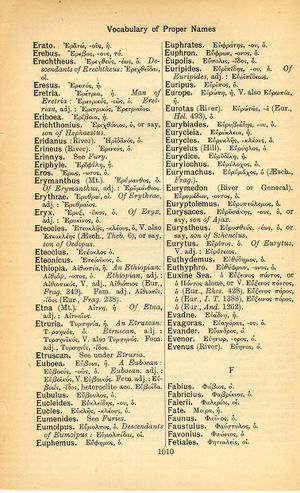Falerii: Difference between revisions
From LSJ
δρυὸς πεσούσης πᾶς ἀνὴρ ξυλεύεται → when the oak falls, everyone cuts wood | when an oak has fallen, every man gathers wood | on the fall of an oak, every man gathers wood | when an oak has fallen, every man becomes a woodcutter | one takes advantage of somebody who has lost his strength | one takes advantage of somebody who has lost his power | when the tree is fallen, every man goes to it with his hatchet
m (Text replacement - "link={{" to "link={{") |
m (Text replacement - "}}]]" to "}}]]") |
||
| Line 1: | Line 1: | ||
{{WoodhouseENELnames | {{WoodhouseENELnames | ||
|Text=[[File:woodhouse_1010.jpg|thumb | |Text=[[File:woodhouse_1010.jpg|thumb | ||
|link={{filepath:woodhouse_1010.jpg | |link={{filepath:woodhouse_1010.jpg}}]]Φαλερίοι, οἱ. | ||
}} | }} | ||
{{Lewis | {{Lewis | ||
Revision as of 10:11, 15 August 2017
English > Greek (Woodhouse)
Φαλερίοι, οἱ.
Latin > English (Lewis & Short)
Fălērĭi: ōrum, m.,
I the capital of the Falisci, a Tuscan people, now Civita Castellana, Liv. 5, 27, 4; v. Falisci.
Latin > French (Gaffiot 2016)
Fălĕrĭī,¹³ ōrum, m., Faléries [ville d’Étrurie, capitale des Falisques] : Liv. 5, 27, 4.
Latin > German (Georges)
Faleriī, iōrum, m., die Hauptstadt der Falisker (s. Faliscī), j. Ruinen bei Civita Castellana, Liv. 5, 27, 4 u.a.

